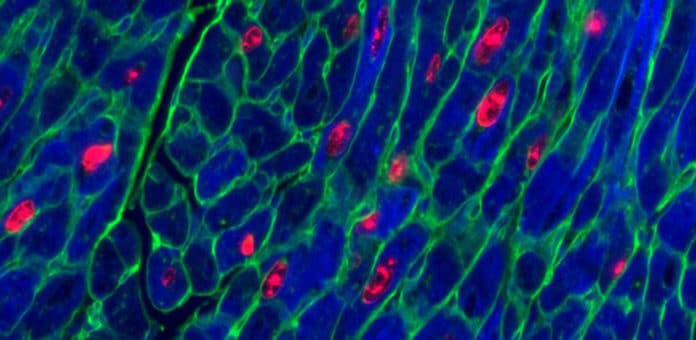None of the current heart disease treatments can reverse the degeneration of the heart tissue – they only slow progression of the disease.
Now, scientists from the University of Cambridge’s Department of Pharmacology are trying to switch off a gene that permits cancer to spread, have made an astounding U-turn. By making the gene overactive and utilitarian in the hearts of mice, they have activated heart cell regeneration.
Scientists believe that outfitting the power of this gene represents significant advancement towards the curative treatment for heart disease.
Cancer develops when cells start to replicate themselves uncontrollably, and the Myc gene plays a crucial role in the process. Targeting this gene, as a means of cancer therapy, is one of the highest priorities in cancer research.
In this study, scientists overactivated the Myc gene in the mouse model and observed its cancerous effects in organs, including the liver and lungs. They found that lots of cells started replicating within a few days. But in the heart, nothing much happened.
Myc-driven activity in heart muscle cells is critically dependent on the level of another protein called Cyclin T1, made by a gene called Ccnt1, within the cells. When the Ccnt1 and Myc genes are expressed together, the heart switches into a regenerative state, and its cells start to replicate.
Scientists observed extensive cell replication after these genes were overexpressed together in the heart muscle cells of adult mice. This causes a huge increment in the number of heart muscle cells.
Scientists used a next-generation sequencing technology called ChIP to see the Myc action in the heart cells. Myc produces a protein – called a transcription factor – that binds to the DNA in specific cells and activates gene expression. But despite the protein binding successfully, the heart cells didn’t start to replicate themselves because the protein could not activate gene expression. Another protein vital to gene expression, Cyclin T1, was deficient in the heart. Adding it to the cells with the overactive Myc caused the cells to start proliferating.
Dr. Catherine Wilson, a researcher at the University of Cambridge’s Department of Pharmacology, said, “None of the current treatment options can reverse the degeneration of heart tissue. The inability of the heart to regenerate itself is a significant unmet clinical need. We found that even when Myc is switched on in a heart, the other tools aren’t there to make it work, which may be one of the reasons heart cancer is so extremely rare. Now we know what’s missing, we can add it and make the cells replicate.”
Cancer Research UK funded this research.
Journal Reference:
- Reactivation of Myc transcription in the mouse heart unlocks its proliferative capacity. DOI: 10.1038/s41467-020-15552-x
